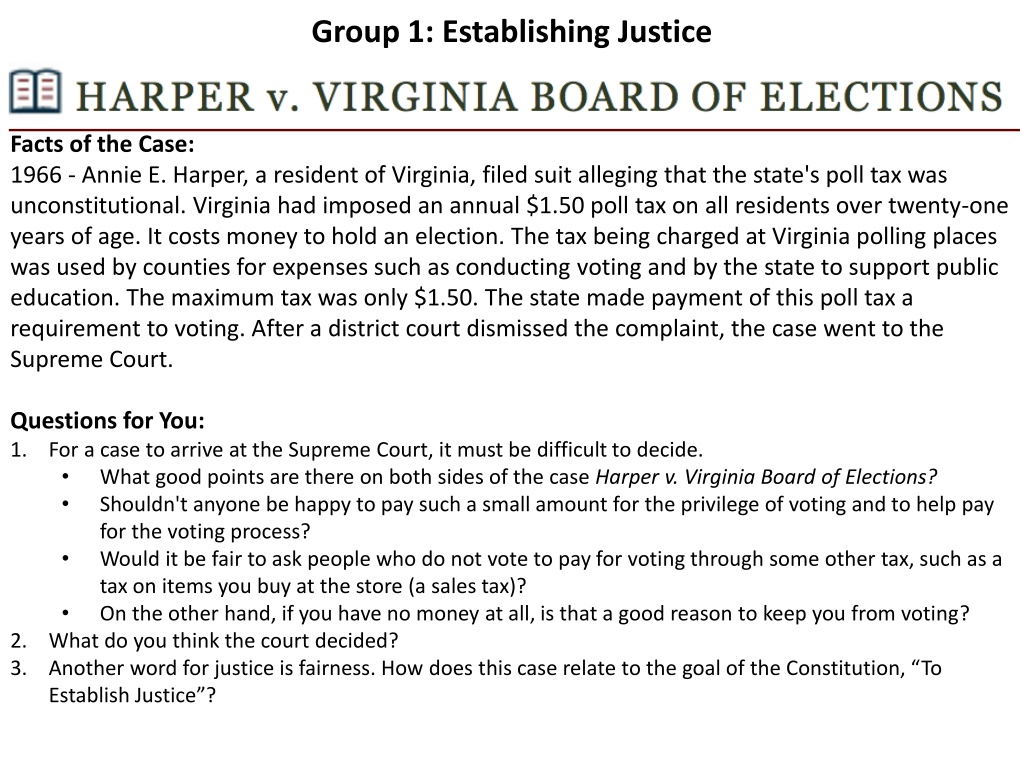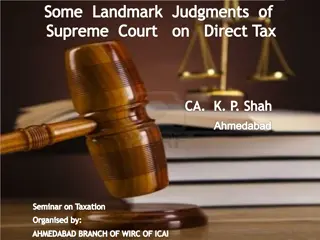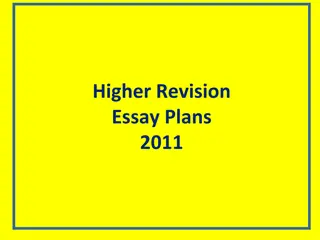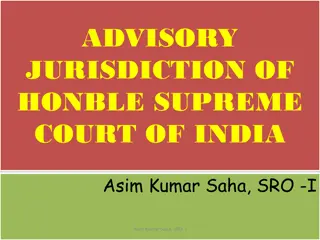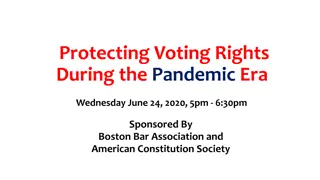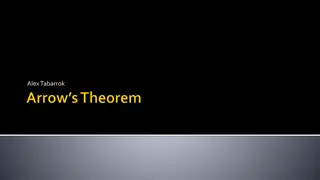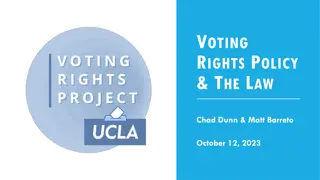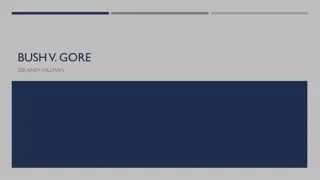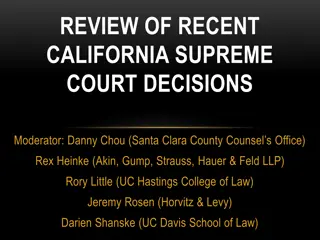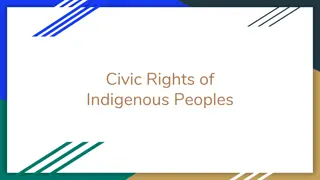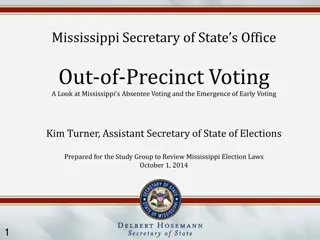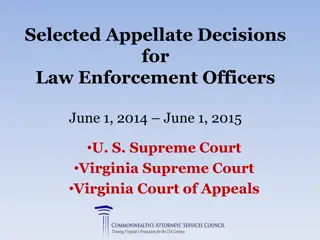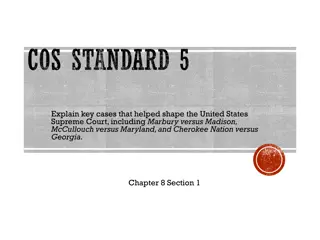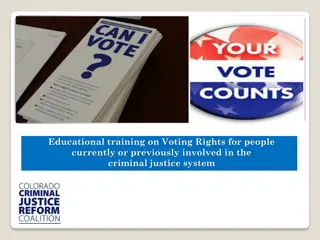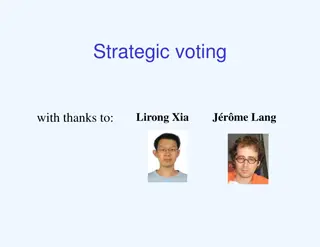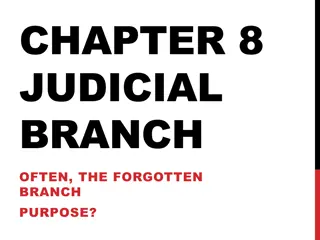Supreme Court Decisions on Voting Rights
The cases of Harper v. Virginia Board of Elections and Burson v. Freeman presented challenges to voting rights laws. In Harper v. Virginia, the Supreme Court ruled the poll tax as unconstitutional, stating it unfairly restricted voting access based on financial means. On the other hand, in Burson v. Freeman, the Court upheld a law restricting campaign activities near polling places to ensure domestic tranquility during elections. These decisions highlighted the balance between protecting voting rights and maintaining order at polling locations.
Download Presentation

Please find below an Image/Link to download the presentation.
The content on the website is provided AS IS for your information and personal use only. It may not be sold, licensed, or shared on other websites without obtaining consent from the author.If you encounter any issues during the download, it is possible that the publisher has removed the file from their server.
You are allowed to download the files provided on this website for personal or commercial use, subject to the condition that they are used lawfully. All files are the property of their respective owners.
The content on the website is provided AS IS for your information and personal use only. It may not be sold, licensed, or shared on other websites without obtaining consent from the author.
E N D
Presentation Transcript
Group 1: Establishing Justice Facts of the Case: 1966 - Annie E. Harper, a resident of Virginia, filed suit alleging that the state's poll tax was unconstitutional. Virginia had imposed an annual $1.50 poll tax on all residents over twenty-one years of age. It costs money to hold an election. The tax being charged at Virginia polling places was used by counties for expenses such as conducting voting and by the state to support public education. The maximum tax was only $1.50. The state made payment of this poll tax a requirement to voting. After a district court dismissed the complaint, the case went to the Supreme Court. Questions for You: 1. For a case to arrive at the Supreme Court, it must be difficult to decide. What good points are there on both sides of the case Harper v. Virginia Board of Elections? Shouldn't anyone be happy to pay such a small amount for the privilege of voting and to help pay for the voting process? Would it be fair to ask people who do not vote to pay for voting through some other tax, such as a tax on items you buy at the store (a sales tax)? On the other hand, if you have no money at all, is that a good reason to keep you from voting? 2. What do you think the court decided? 3. Another word for justice is fairness. How does this case relate to the goal of the Constitution, To Establish Justice ?
Group 1: Establishing Justice Conclusion Decision: 6 votes for Harper, 3 vote(s) against Legal provision: Equal Protection In a 6-to-3 decision, the Court decided it was unfair to require a person to pay to vote, because not all Americans can afford it. This fee, they said, violated the Equal Protection Clause of the 14th Amendment.
Group 2: Ensuring Domestic Tranquility Facts of the Case 1991 - Freeman, a Tennessee political campaign worker, challenged the constitutionality of the Tennessee Code forbidding the solicitation of votes (asking for votes) and the display or distribution of campaign materials (signs and leaflets) within 100 feet of entrances to polling facilities. Question for the Court: Did Tennessee's 100-foot limit violate the First Amendment's freedom of speech? Questions for You: 1. For a case to arrive at the Supreme Court, it must be difficult to decide. What good points are there on both sides of this case? 2. In order to cast your ballot you must physically go to the polling location. Shouldn't voters be able to walk to the polling place in peace and quiet (such peace and quiet could be considered one kind of domestic tranquility) without someone trying to get them to vote for their candidate? On the other hand, don't we have the right to talk to people about candidates we want elected? 3. What do you think the court decided? 4. What does it mean to "insure domestic tranquility"? How did the case Burson v. Freeman ensure domestic tranquility"? What other examples of domestic tranquility can you list?
Group 2: Ensuring Domestic Tranquility Conclusion Decision: 5 votes for Burson, 3 vote(s) against Legal provision: Amendment 1: Speech, Press, and Assembly By creating a safe zone around polling sites, the statute served the state's interest in protecting its citizen's right to vote freely and effectively. Moreover, the 100-foot zone was acceptable since it was not so large as to completely block out the presence of political messages (Can you see and hear farther than 100 ft? )
Group 3: Providing for the Common Defense Excerpt: FDR s Request to Congress to Declare War on Japan (December 8, 1941) As Commander in Chief of the Army and Navy I have directed that all measures be taken for our defense. But always will our whole Nation remember the character of the onslaught against us. No matter how long it may take us to overcome this premeditated invasion, the American people in their righteous might will win through to absolute victory. I believe that I interpret the will of the Congress and of the people when I assert that we will not only defend ourselves to the uttermost but will make it very certain that this form of treachery shall never again endanger us. Hostilities exist. There is no blinking at the fact that our people, our territory, and our interests are in grave danger. With confidence in our armed forces -- with the unbounding determination of our people -- we will gain the inevitable triumph -- so help us God. I ask that the Congress declare that since the unprovoked and dastardly attack by Japan on Sunday, December 7, 1941, a state of war has existed between the United States and the Japanese Empire. Questions for You: 1. Why did the President have to ask Congress to declare war? 2. Why didn't he declare war himself? 3. Why does it make sense to require the President to ask Congress? 4. How does that help provide for the "common" defense? 5. How does our government today "provide for the common defense ? 6. What does "provide for the common defense" mean?
Group 4: Promoting the General Welfare Upton Sinclair s Letter to President Teddy Roosevelt (March 10, 1906) Background: In 1906, no one was required to inspect meat that was sold to the American public. Public reaction to Upton Sinclair's book The Jungle was a major factor in the passage of the 1907 Meat Inspection Act, which established a system of meat inspection that lasted until July 1996, when the federal government announced new rules requiring more scientifically advanced methods of meat inspection. I am glad to learn that the Department of Agriculture has taken up the matter of inspection, or lack of it, but I am exceedingly dubious as to what they will discover. I have seen so many people go out there and be put off with smooth pretences. A man has to be something of a detective, or else intimate with the working-men, as I was, before he can really see what is going on. And it is becoming a great deal more difficult since the publication of "The Jungle . . . I was escorted through Packingtown by a young lawyer who was brought up in the district, had worked as a boy in Armour's plant, and knew more or less intimately every foreman, "spotter," and watchman about the place. I saw with my own eyes hams, which had spoiled in pickle, being pumped full of chemicals to destroy the odor. I saw waste ends of smoked beef stored in barrels in a cellar, in a condition of filth which I could not describe in a letter. I saw rooms in which sausage meat was stored, with poisoned rats lying about, and the dung of rats covering them. I saw hogs which had died of cholera in shipment, being loaded into box cars to be taken to a place called Globe, in Indiana, to be rendered into lard. Finally, I found a physician, Dr. William K. Jaques, 4316 Woodland avenue, Chicago, who holds the chair of bacteriology in the Illinois State University, and was in charge of the city inspection of meat during 1902-3, who told me he had seen beef carcasses, bearing the inspectors' tags of condemnation, left upon open platforms and carted away at night, to be sold in the city Questions for You: 1. Shouldn't the companies that sell meat inspect the meat they sell? 2. Why should the government have a system for inspecting meat? 3. How do meat inspections "promote the general welfare ? 4. What else does the government do to promote the general welfare? 5. What does "promoting the general welfare" mean?
Group 5: Securing the Blessings of Liberty to Ourselves Facts of the Case: 1971 - Jonas Yoder and Wallace Miller, both members of the Old Order Amish religion, and Adin Yutzy, a member of the Conservative Amish Mennonite Church, were prosecuted under a Wisconsin law that required all children to attend public schools until age 16. The three parents refused to send their children to such schools after the eighth grade, arguing that high school attendance was contrary to their religious beliefs. Question for the Court: Did Wisconsin's requirement that all parents send their children to school at least until age 16 violate the First Amendment by criminalizing the conduct of parents who refused to send their children to school for religious reasons? Questions for You: 1. For a case to arrive at the Supreme Court, it must be difficult to decide. What good points are there on both sides of this case? 2. Parents have many legal rights over their children. Why do some people believe parents should be required to send their children to school? On the other hand, shouldn't parents be able to raise their kids the way they want? 3. What do you think the Supreme Court decided in this case? 4. What does liberty mean? What might happen if everybody felt s/he had the liberty to do what ever s/he wanted no matter what the consequences? When, why and how should liberties ever be restrained ... and when should they not be? 5. What does it mean to "secure the blessings of liberty to ourselves ?
Group 5: Securing the Blessings of Liberty to Ourselves Conclusion Decision: 7 votes for Yoder, 0 vote(s) against Legal provision: Free Exercise of Religion In a unamimous decision, the Court held that an individual's free exercise of religion under the First Amendment outweighed the State's interests in compelling school attendance beyond the eighth grade. In the majority opinion, the Court found that the values and programs of secondary school were "in sharp conflict with the life mandated by the Amish religion," and that an additional one or two years of high school would not produce the benefits of public education cited by Wisconsin to justify the law.
Group 6: Securing the Blessing of Liberty to our Posterity Coal Breaker Boys (1890s) Background: Work in the coal breakers is exceedingly hard and dangerous. Crouched over the chutes, the boys sit hour after hour, picking out the pieces of slate and other refuse from the coal as it rushes past to the washers. From the cramped position they have to assume, most of them become more or less deformed and bent-backed like old men. The coal is hard, and accidents to the hands, such as cut, broken, or crushed fingers, are common among the boys. Sometimes there is a worse accident: a terrified shriek is heard, and a boy is mangled and torn in the machinery, or disappears in the chute to be picked out later smothered and dead. Clouds of dust fill the breakers and are inhaled by the boys, laying the foundations for asthma and miners' consumption. Questions for You: 1. Wouldn't some children your age be tempted to leave school and take up a job if they could? What's wrong with that? 2. Why are there no more coal breaker boys? 3. The Constitution is still being changed with amendments. Our country's laws are still being changed today. How does improving the rules today help secure the blessings of liberty for people in the future (that's what "posterity" means)? Can you think of some other ways the government makes sure people in the future will have liberty? 4. What does "securing the blessing of liberty to our posterity" mean?
